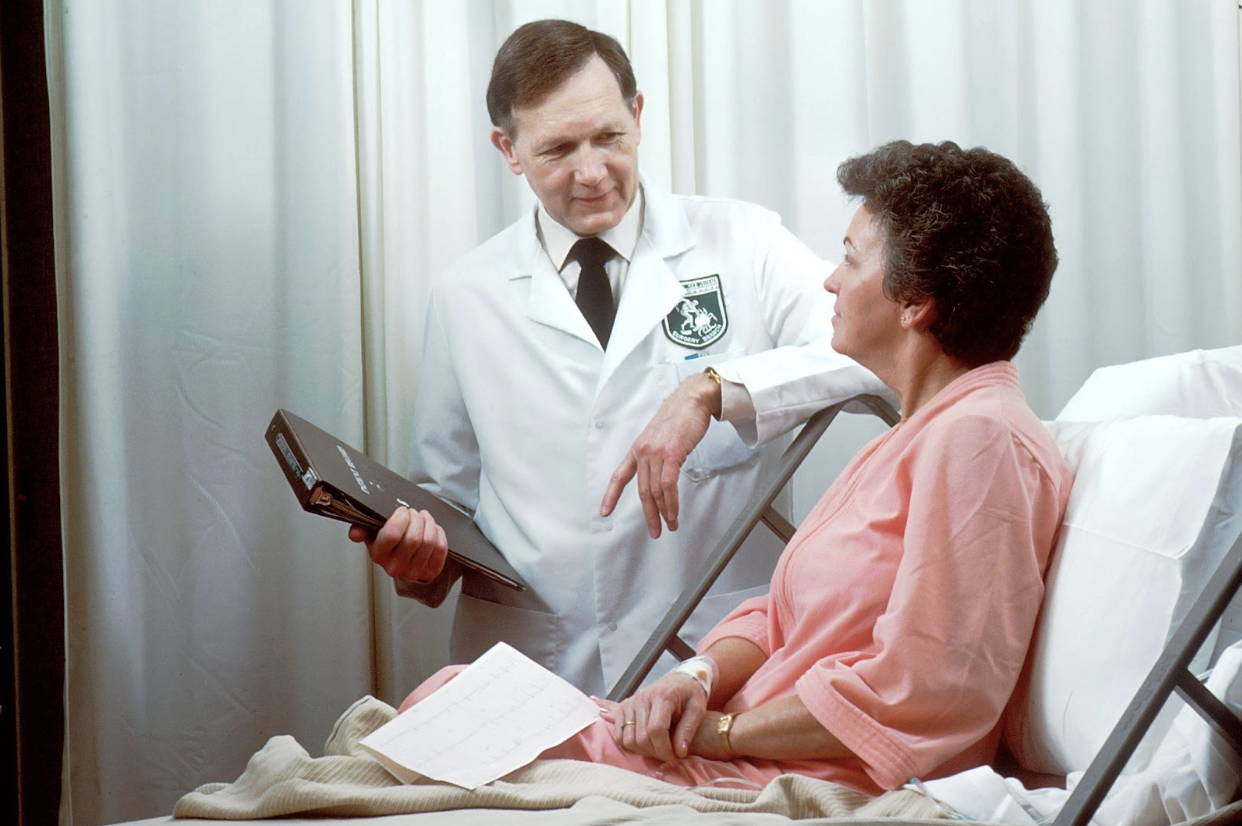It can be hard to know when to see your doctor about back pain. These five signs may help you decide when to make an appointment.

September 2022. This article is independently written by Shelby Golding. All opinions given are hers. Shelby has been certified as a personal trainer and nutritional specialist since 2007. In 2008, she found her passion for writing about these topics and hasn't looked back.

Back pain is one of the most common types of pain that people experience regularly. In situations like the one listed above, back pain is an expected result of heavy lifting, overuse, or strain. But in some instances, back pain is a symptom of a more significant problem.
How do you know when to see your doctor about back pain? Please keep reading to learn five signs that it's time to make an appointment!
The Five Signs
These five signs mark either an increase in severity or an underlying problem that you can only address with the help of a medical professional. So give your doctor a call if one or more of them is present.
1. Pain is Constant or Intense
Constant or intense pain is a warning sign to see your doctor. Persistent, severe pain might appear as muscle spasms or sharp pain in any part of your back.
When you consistently strain your back muscles, it can result in some severe issues. You might pull a muscle or ligament, resulting in muscle spasms. Or you could tear or break a disc — the small pieces of cartilage that sit between vertebrae — causing it to bulge or rupture.
Intense back pain could also be caused by an underlying disease. For example, arthritis often affects the lower back. Severe arthritis might eventually cause spinal stenosis, where the space around your spinal cord gets narrower over time, putting more pressure on the nerves and causing pain.
2. Weakness, Numbness, or Tingling in Extremities
Sometimes, back pain arrives alongside other issues like weakness, numbness, or tingling. Whether the symptoms are in the upper or lower body depends on which part of the spine is affected. For example, upper body symptoms could result from issues in the cervical or thoracic vertebrae. In contrast, lower body symptoms might result from problems in the lumbar spine.
In either case, these symptoms are caused by nerve disorders that result in peripheral neuropathy. Some health issues that might cause peripheral neuropathy include diabetes, vitamin/mineral deficiencies, inflammatory conditions, alcoholism, kidney failure, and rheumatologic disorders.
While nerve disorders are not always serious, they're a sign that you need to talk to your doctor.
3. Unintended Weight Loss
Sudden, unexpected weight loss should always be a cause for concern. When your body sheds weight quickly, it's often trying to compensate for issues in another part of the body.
When back pain appears alongside unintended weight loss, you want to make an appointment to see your doctor as soon as possible.
Weight loss and back pain could point to several life-threatening issues. One such issue is endocarditis, which occurs when bacteria collects in the heart's inner lining. As a result, your metabolism kicks into overdrive and burns fat quickly, resulting in weight loss. Often, people with endocarditis will also have a fever and reduced appetite.
Another dangerous disease associated with back pain is spinal tuberculosis. Spinal TB destroys and collapses the vertebrae over time. Other symptoms might include night sweats and fever.
When back pain appears alongside unintended weight loss, you want to make an appointment to see your doctor as soon as possible.
Weight loss and back pain could point to several life-threatening issues. One such issue is endocarditis, which occurs when bacteria collects in the heart's inner lining. As a result, your metabolism kicks into overdrive and burns fat quickly, resulting in weight loss. Often, people with endocarditis will also have a fever and reduced appetite.
Another dangerous disease associated with back pain is spinal tuberculosis. Spinal TB destroys and collapses the vertebrae over time. Other symptoms might include night sweats and fever.
4. Lasts More Than 3 Months
Back pain that lasts longer than three months — otherwise known as chronic back pain — is another reason to seek medical attention. Over time, chronic back pain will most likely interfere with other aspects of your life. For example, you may have trouble sleeping, depression, anxiety, stress, and poorer quality of life.
Chronic back pain could be due to various diseases, from arthritis to cancer. It may also result from spinal stenosis, a herniated disc, sciatica, endometriosis, fibromyalgia, kidney stones, obesity, scoliosis, or other medical issues. So, you can see why you might need the help of a medical professional to identify what might be causing your long-term back pain.
Chronic back pain could be due to various diseases, from arthritis to cancer. It may also result from spinal stenosis, a herniated disc, sciatica, endometriosis, fibromyalgia, kidney stones, obesity, scoliosis, or other medical issues. So, you can see why you might need the help of a medical professional to identify what might be causing your long-term back pain.
5. Bowel or Bladder Control Problems
Sciatica, spinal stenosis, and herniated discs may cause bowel or bladder control problems. However, incontinence issues might also be related to issues with digestion, for which back pain is a symptom. For example, back pain is a symptom of irritable bowel syndrome (IBS), which is an intestinal disorder.
Cauda equina syndrome (CES) usually has back pain and incontinence co-occurring. CES is when a pinched nerve at the end of the spinal canal causes many symptoms, including low back pain, incontinence, numbness, and leg weakness.
Cauda equina syndrome (CES) usually has back pain and incontinence co-occurring. CES is when a pinched nerve at the end of the spinal canal causes many symptoms, including low back pain, incontinence, numbness, and leg weakness.
Consequences of Ignoring Pain
These five signs indicate that it's time to see a doctor because they are evidence of deeper issues within the body. Untreated pain can have dramatic consequences — it compromises your ability to move, but it might also influence your psychological and emotional health.
Ignoring pain may result in chronic pain, where the injury itself heals, but the pain remains. Chronic pain is challenging to treat because it forms new neural pathways that keep pain around even when you should be feeling better. You then have to engage the mind to reroute these neural pathways and deal with any unacknowledged psychological, emotional, and physical issues that could perpetuate your pain.
Ignoring pain may result in chronic pain, where the injury itself heals, but the pain remains. Chronic pain is challenging to treat because it forms new neural pathways that keep pain around even when you should be feeling better. You then have to engage the mind to reroute these neural pathways and deal with any unacknowledged psychological, emotional, and physical issues that could perpetuate your pain.
No, You Shouldn't "Suck It Up"

You need to stay conscious to know when back pain is a signal to alert you to deeper, more pressing issues, especially when the pain becomes difficult to bear. Allowing yourself to get used to back pain sets a dangerous precedent. While it's true that back pain isn't always life-threatening, untreated pain might eventually become chronic or might indicate a more serious life-threatening disease.
Finally, remember to use your Kailo Pain Patch as you solve your back pain issues. It's designed to relieve pain in seconds without oral medication, and scientists theorize that the Kailo Pain Patch works by interfering with your body's electrical system. In addition, an exciting new clinical study showed a significant decrease in musculoskeletal pain, such as back pain, neck pain, muscle and tendon pain, and many others.
Disclaimer: Kailo should not be used if you have a pacemaker or are pregnant. Always consult your doctor or health care professional before using Kailo.
Finally, remember to use your Kailo Pain Patch as you solve your back pain issues. It's designed to relieve pain in seconds without oral medication, and scientists theorize that the Kailo Pain Patch works by interfering with your body's electrical system. In addition, an exciting new clinical study showed a significant decrease in musculoskeletal pain, such as back pain, neck pain, muscle and tendon pain, and many others.
Disclaimer: Kailo should not be used if you have a pacemaker or are pregnant. Always consult your doctor or health care professional before using Kailo.






